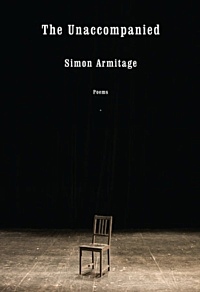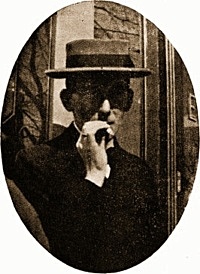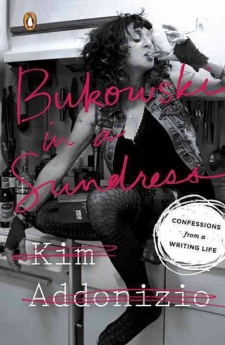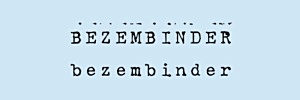Fleurs du Mal Magazine


Or see the index
A powerful new collection of poetry from the National Book Critics Circle Award nominee and recipient of the Forward Poetry Prize.

In The Unaccompanied, Armitage gives voice to the people of Britain with a haunting grace.
We meet characters whose sense of isolation is both emotional and political, both real and metaphorical, from a son made to groom the garden hedge as punishment, to a nurse standing alone at a bus stop as the centuries pass by, to a latter-day Odysseus looking for enlightenment and hope in the shadowy underworld of a cut-price supermarket.
We see the changing shape of England itself, viewed from a satellite “like a shipwreck’s carcass raised on a sea-crane’s hook, / nothing but keel, beams, spars, down to its bare bones.”
In this exquisite collection, Armitage X-rays the weary but ironic soul of his nation, with its “Songs about mills and mines and a great war, / lines about mermaids and solid gold hills, / songs from broken hymnbooks and cheesy films”–in poems that blend the lyrical and the vernacular, with his trademark eye for detail and biting wit.
Simon Armitage was born in West Yorkshire and is Professor of Poetry at the University of Sheffield. A recipient of numerous prizes and awards, he has published eleven collections of poetry, including Seeing Stars, Paper Aeroplane: Selected Poems 1989 – 2014, and his acclaimed translation of Sir Gawain and the Green Knight.
The Shout: Selected Poems, was nominated for the National Book Critics Circle Award and his translation of the medieval poem Pearl received the 2017 PEN Award for Poetry in Translation. He writes extensively for radio and television, has published three best-selling non-fiction titles, and his theatre works include The Last Days of Troy, performed at Shakespeare’s Globe in London. He has taught at the University of Iowa’s Writers’ Workshop, and in 2015 was appointed Professor of Poetry at Oxford University.
Simon Armitage
The Unaccompanied
Poems
Published by Knopf
Hardcover
$27.00
Aug. 2017
96 Pages
ISBN 9781524732424
new poetry
fleursdumal.nl magazine
More in: #Editors Choice Archiv, - Book News, Archive A-B, Archive A-B, Armitage, Simon, Art & Literature News, Mermaids

Ontgoocheling
Laat mij niet almaar zinloos lijden,
Zeg niet dat jij nog van mij houdt,
Wat er ook was in vroeger tijden,
Het laat mijn arme hart nu koud!
Nee, ik geloof niet in jouw liefde,
Nee, ik geloof daar niet meer aan,
Sinds jij mijn arme ziel zo griefde,
Kan ik mij niet meer laten gaan!
Vergeet de uren, thans vervlogen,
Vergroot de blinde wanhoop niet,
Mijn zieke hart, zozeer bedrogen,
Zag graag dat jij het rusten liet!
Ik slaap, ben net in slaap gevallen,
Vergeet jouw dromen van weleer,
Wat er ook was, ‘t is ons ontvallen,
Dit hart krijg jij niet wakker meer.
Jevgeni Baratynski,
(1800 – 1844)
Разуверение,
gedicht 1821,
vertaling Paul Bezembinder, 2016.
(Meer over Paul Bezembinder is te vinden op zijn website: www.paulbezembinder.nl)
fleursdumal.nl magazine
More in: Archive A-B, Archive A-B, Baratynski, Bezembinder, Paul, CLASSIC POETRY

La double ivresse
Je reposais sous l’ombrage,
Quand Nœris vint m’éveiller :
Je crus voir sur son visage
Le feu du désir briller.
Sur son front Zéphyr agite
La rose et le pampre vert ;
Et de son sein qui palpite
Flotte le voile entrouvert.
Un enfant qui suit sa trace
(Son frère, si je l’en crois)
Presse pour remplir sa tasse
Des raisins entre ses doigts.
Tandis qu’à mes yeux la belle
Chante et danse à ses chansons,
L’enfant, caché derrière elle,
Mêle au vin d’affreux poisons.
Nœris prend la tasse pleine,
Y goûte, et vient me l’offrir.
Ah ! dis-je, la ruse est vaine :
Je sais qu’on peut en mourir.
Tu le veux, enchanteresse !
Je bois, dussé-je en ce jour
Du vin expier l’ivresse
Par l’ivresse de l’amour.
Mon délire fut extrême :
Mais aussi qu’il dura peu !
Ce n’est plus Nœris que j’aime,
Et Nœris s’en fait un jeu.
De ces ardeurs infidèles
Ce qui reste, c’est qu’enfin,
Depuis, à l’amour des belles
J’ai mêlé le goût du vin.
Pierre-Jean de Béranger
(1780-1857)
La double ivresse
Toutes les chansons de Béranger (1843)
fleursdumal.nl magazine
More in: Archive A-B, Archive A-B, Béranger, Pierre-Jean de

Früh, eh der Tag
Früh, eh der Tag seine Schwingen noch regt,
Alles noch schlummert und träumet und ruht,
Blümchen noch nickt in der Winde Hut,
Eh noch im Forste ein Vogel anschlägt,
Schreitet ein Engel
Durchs tauweiße Land
Streut ans den Segen
Mit schimmernder Hand.
Und es erwachet die Au und der Wald.
Blumen bunt reiben die Äuglein sich klar,
Staunen und flüstern in seliger Schar.
Aufstrahlt die Sonne, ein Amselruf schallt.
Aber der Engel
Zog längst schon landaus.
Flog wieder heim
In sein Vaterhaus.
Hugo Ball
(1886-1927)
Gedicht: Früh, eh der Tag
fleursdumal.nl magazine
More in: Archive A-B, Ball, Hugo, DADA, Dada, Dadaïsme

Across the Fields to Anne
How often in the summer-tide,
His graver business set aside,
Has stripling Will, the thoughtful-eyed,
As to the pipe of Pan,
Stepped blithesomely with lover’s pride
Across the fields to Anne.
It must have been a merry mile,
This summer stroll by hedge and stile,
With sweet foreknowledge all the while
How sure the pathway ran
To dear delights of kiss and smile,
Across the fields to Anne.
The silly sheep that graze to-day,
I wot, they let him go his way,
Nor once looked up, as who should say:
“It is a seemly man.”
For many lads went wooing aye
Across the fields to Anne.
The oaks, they have a wiser look;
Mayhap they whispered to the brook:
“The world by him shall yet be shook,
It is in nature’s plan;
Though now he fleets like any rook
Across the fields to Anne.”
And I am sure, that on some hour
Coquetting soft ‘twixt sun and shower,
He stooped and broke a daisy-flower
With heart of tiny span,
And bore it as a lover’s dower
Across the fields to Anne.
While from her cottage garden-bed
She plucked a jasmine’s goodlihede,
To scent his jerkin’s brown instead;
Now since that love began,
What luckier swain than he who sped
Across the fields to Anne?
The winding path whereon I pace,
The hedgerow’s green, the summer’s grace,
Are still before me face to face;
Methinks I almost can
Turn poet and join the singing race
Across the fields to Anne!
Richard Burton
(1861-1940)
fleursdumal.nl magazine
More in: Archive A-B, Archive A-B, CLASSIC POETRY
Passionate and irreverent, Mortal Trash transports the readers into a world of wit, lament, and desire.
 In a section called “Over the Bright and Darkened Lands,” canonical poems are torqued into new shapes. “Except Thou Ravish Me,” reimagines John Donne’s famous “Batter my heart, Three-person’d God” as told from the perspective of a victim of domestic violence.
In a section called “Over the Bright and Darkened Lands,” canonical poems are torqued into new shapes. “Except Thou Ravish Me,” reimagines John Donne’s famous “Batter my heart, Three-person’d God” as told from the perspective of a victim of domestic violence.
Like Pablo Neruda, Addonizio hears “a swarm of objects that call without being answered”: hospital crash carts, lawn gnomes, Evian bottles, wind-up Christmas creches, edible panties, cracked mirrors.
Whether comic, elegiac, or ironic, the poems in Mortal Trash remind us of the beauty and absurdity of our time on earth.
From “Scrapbook”:
We believe in the one-ton rose
and the displaced toilet equally. Our blues
assume you understand
not much, and try to be alive, just as we do,
and that it may be helpful to hold the hand
of someone as lost as you.
Title: Mortal Trash
Subtitle: Poems
Author: Kim Addonizio
Publisher: W. W. Norton
Published 28 June 2017
ISBN-10 0393354342
ISBN-13 9780393354348
112 pages
Paperback – $15.95

More from Kim Addonizio
Bukowski in a Sundress
Confessions from a Writing Life
by Kim Addonizio
Behold the memoir of sex-positive rebel Kim Addonizio! This book moves from gritty/funny/sexy, to emotionally raw, in swift seamless strokes.
By the end, you will feel that Kim is an old friend whom you know far too well, but who you think the world of because she’s way cooler than you are.
Bukowski in a Sundress:
Confessions from a Writing Life
by Kim Addonizio (Author)
Paperback, 2016
Biography & Memoir
Publisher: Penguin Group USA
ISBN: 9780143128465
224 pages
$26.99
new books
fleursdumal.nl magazine
More in: - Book News, - Book Stories, Archive A-B, Archive A-B, Art & Literature News, Bukowski, Charles

Gestolen tijd
Zij was zijn lief en op een dag brak zij
zijn hart. Hij dook weg in een theorie
van scherven en geluk. Zo hoefde hij
nog niet te wennen aan een wereld die
de trekken hebben zou van haar gezicht.
Hij zocht haar jaren later pas weer op.
Zij brak zijn hart opnieuw. Zijn theorie,
hoe stevig ook, was nog volstrekt niet
opgewassen tegen de ravage die de
tijd in haar gezicht had aangericht.
Paul Bezembinder
gedicht: Gestolen tijd
Paul Bezembinder studeerde theoretische natuurkunde in Nijmegen. In zijn poëzie zoekt hij in vooral klassieke versvormen en thema’s naar de balans tussen serieuze poëzie, pastiche en smartlap. Zijn gedichten (Nederlands) en vertalingen (Russisch-Nederlands) verschenen in verschillende (online) literaire tijdschriften. Voorbeelden van zijn werk zijn te vinden op zijn website, www.paulbezembinder.nl
fleursdumal.nl magazine
More in: Archive A-B, Archive A-B, Art & Literature News, Bezembinder, Paul, POETRY IN TRANSLATION: BEZEMBINDER

Meet We no Angels, Pansie?
Came, on a Sabbath noon, my sweet,
In white, to find her lover;
The grass grew proud beneath her feet,
The green elm-leaves above her:–
Meet we no angels, Pansie?
She said, ‘We meet no angels now’;
And soft lights stream’d upon her;
And with white hand she touch’d a bough;
She did it that great honour:–
What! meet no angels, Pansie?
O sweet brown hat, brown hair, brown eyes,
Down-dropp’d brown eyes, so tender!
Then what said I? Gallant replies
Seem flattery, and offend her:–
But–meet no angels, Pansie?
Thomas Ashe
(1836-1889)
Meet We no Angels, Pansie?
fleursdumal.nl magazine
More in: Archive A-B, Archive A-B, CLASSIC POETRY

Amper een bestemming
Van om de hoek is daar opeens
dat meisje: haar rechterhand
trekt een ballon, hartvormig
glimmend rood. Ze oogt zich
er niet van bewust, deint samen
met het ding naar amper een
bestemming. Geen lust in
doelgericht lopen is haar aan
te zien. De straat draagt haar
welhaast verlegen.
Bert Bevers
gedicht: Amper een bestemming
Verschenen in Appel, jaargang 19, nummer 1, Sint-Truiden, 1994
Bert Bevers is a poet and writer who lives and works in Antwerp (Be)
fleursdumal.nl magazine
More in: Archive A-B, Archive A-B, Bevers, Bert

Ick bin in Tempelhof jebore
Ick bin in Tempelhof jeboren
Der Flieder wächst mich aus die Ohren.
In meinem Maule grast die Kuh.
Ick geh zuweilen sehr und schwanger
Auf einem Blumen-i-o-anger
Mein Vater, was sagst Du dazu?
Wir gleichen sehr den Baletteusen,
Pleureusen – Dösen – Schnösen – lösen.
Gewollt zu haben – selig sein.
Verehrte Herrn, verehrte Damen,
Die um mich hören herzu kamen
Dies widmet der Gesangverein.
Und Jungfraun kamen wunderbar
Geschmeide scheidegelb im Haar
Mit schlankgestielten Lilien.
Der Kakagei und Papadu
Die sahen auch dabei dazu
Und kamen aus Brasilien.
(Klarinetta Klaball)
Hugo Ball
(1886-1927)
Ick bin in Tempelhof jebore
fleursdumal.nl magazine
More in: Archive A-B, Ball, Hugo, Dada, DADA, Dadaïsme

Song
Love in Phantastique Triumph sat,
Whilst Bleeding hearts about him flow’d,
For whom fresh pays he did create,
And strange Tyrannick pow’r he shew’d;
From thy bright Eyes he took his fires,
Which round about in sport he hurl’d;
But ’twas from mine he took desires,
Enough t’undoe the Amorous world.
From me he took his sighs and tears,
From thee his pride and cruelty;
From me his languishments and fears,
And ev’ry killing Dart from thee:
Thus thou, and I, the God have arm’d,
And set him up a Deity,
But my poor heart alone is harm’d,
Whilst thine the Victor is, and free.
Aphra Behn
(1640-1689)
From Abdelazer, or the Moor’s Revenge:
Song
fleursdumal.nl magazine
More in: Archive A-B, Archive A-B, CLASSIC POETRY

Jaag zacht
Praat niet hardop in het woud.
Dat is voor niets goed. Immers:
de waarheid is als een schuw dier.
Mensen hebben er schrik van.
Bert Bevers
gedicht: Jaag zacht
Verschenen in de Enghuizer Dialogen VIII, Hummelo, mei 2017
Bert Bevers is a poet and writer who lives and works in Antwerp (Be)
fleursdumal.nl magazine
More in: Archive A-B, Archive A-B, Bevers, Bert, Natural history
Thank you for reading Fleurs du Mal - magazine for art & literature